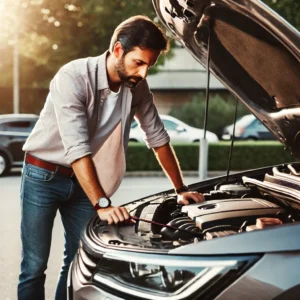Experiencing your car jerking when you accelerate can be quite unsettling. This issue, often called “car jerking,” can show up as anything from mild vibrations to serious jolts. Knowing why this happens is key to fixing the problem and making your drive smoother and safer.

Jerking during acceleration usually signals a deeper problem within your car’s complex systems. It could be due to issues with the ignition system, fuel delivery, transmission, engine mounts, or even the exhaust system. Pinpointing the exact cause is vital to find the right solution and get your car running smoothly again.

In this simple guide, we’ll go over common reasons your car might jerk when you accelerate, how to diagnose the problem, and when it’s time to seek professional auto repairs. By understanding these causes, you can take steps to fix the issue and enjoy a more reliable driving experience.
What are the causes of Car Jerking When Accelerating
Faulty ignition system
The ignition system plays a crucial role in providing the spark necessary for combustion within the engine cylinders. When this system malfunctions, it can lead to misfiring or incomplete combustion, resulting in jerking or shuddering during acceleration.
Potential issues within the ignition system that could contribute to car jerking include:
- Worn or faulty spark plugs
- Defective ignition coils
- Damaged or frayed spark plug wires
- Malfunctioning distributor (in older vehicles)
Fuel delivery issues
Ensuring correct fuel delivery is crucial for a smoothly running engine. Any disruption in the fuel supply or distribution can cause jerking or hesitation during acceleration.
Common fuel delivery issues that may lead to car jerking include:
- Clogged or dirty fuel filter
- Faulty fuel pump
- Leaks in the fuel line or injector system
- Malfunctioning fuel pressure regulator
Problems with the transmission
The transmission is crucial for transferring power from the engine to the wheels. Issues with the transmission can manifest as jerking or shuddering during acceleration.
Potential transmission-related causes of car jerking include:
- Worn or slipping transmission bands or clutches
- Low or contaminated transmission fluid
- Faulty solenoids or sensors within the transmission
- Malfunctioning torque converter (in automatic transmissions)
Worn-out engine mounts
Engine mounts are designed to securely hold the engine in place while absorbing vibrations and preventing excessive movement. When these mounts become worn or damaged, they can allow excessive engine movement, leading to jerking or shuddering sensations during acceleration.
Worn engine mounts can cause:
- Increased engine vibration
- Misalignment between the engine and transmission
- Excessive stress on other components
Dirty or clogged fuel injectors
Fuel injectors ensure the precise delivery of fuel needed for combustion. Over time, these injectors can become clogged or dirty, leading to inconsistent fuel delivery and uneven combustion.
Signs of dirty or clogged fuel injectors include:
- Rough idling
- Hesitation or jerking during acceleration
- Decreased fuel efficiency
- Engine misfiring

Malfunctioning sensors
Modern vehicles rely on a network of sensors to monitor various systems and provide accurate data to the engine control unit (ECU). If any of these sensors malfunction, it can cause the ECU to make incorrect adjustments, leading to jerking or hesitation during acceleration.
Common sensors that can contribute to car jerking include:
- Mass airflow (MAF) sensor
- Throttle position sensor (TPS)
- Oxygen (O2) sensors
- Camshaft position sensor
- Crankshaft position sensor
Issues with the exhaust system
The exhaust system plays a crucial role in expelling the byproducts of combustion from the engine. If there are any blockages or leaks in the exhaust system, it can disrupt the engine’s air-fuel mixture and combustion process, leading to jerking or hesitation during acceleration.
Potential exhaust system issues that can cause car jerking include:
- Clogged or restricted catalytic converter
- Exhaust leaks or holes
- Faulty exhaust gas recirculation (EGR) valve
- Restricted muffler or resonator
How to Diagnose and Fix Car Jerking When Accelerating
Diagnosing the root cause of car jerking when accelerating can be a complex process, as various systems and components can contribute to this issue. Here are some steps you can take to identify and address the problem:
Check for diagnostic trouble codes
Modern vehicles are equipped with on-board diagnostic (OBD) systems that can detect and store trouble codes related to various systems. If you’re experiencing issues, consider taking your vehicle to Auto Repair Hurst TX, where a professional technician can use an OBD-II scanner to read and interpret these codes, providing valuable insights into the potential cause of the jerking.
Perform visual inspections
Conduct a thorough visual inspection of the ignition system components, fuel delivery system, transmission, engine mounts, and exhaust system. Look for any signs of wear, damage, or leaks that could contribute to the jerking issue.
Check fluid levels and condition
Ensure that the engine oil, transmission fluid, and coolant levels are within the recommended range and in good condition. Contaminated or low fluid levels can adversely affect component performance and contribute to jerking.
Test components
Depending on the suspected cause, you or a professional technician may need to perform specific tests to diagnose the issue. This could involve testing the ignition system components, checking fuel pressure, inspecting the transmission, or analyzing sensor readings.
Replace faulty components
Once the root cause has been identified, replace any faulty or worn components contributing to the jerking issue. This could involve replacing spark plugs, fuel injectors, sensors, transmission components, or engine mounts, among others.
Perform a road test
After addressing the suspected cause, take the vehicle for a road test to evaluate the effectiveness of the repairs. Monitor for any remaining jerking or hesitation during acceleration.
When to Seek Professional Help
While some diagnostic and repair tasks can be performed by knowledgeable DIY enthusiasts, there are situations where seeking professional help is advisable:
If you lack the necessary tools, equipment, or expertise to diagnose and repair the issue safely and effectively
If you don’t have the right tools or the know-how to safely and effectively diagnose and fix the problem, it’s best to call a professional. Attempting repairs without the proper equipment or expertise can be dangerous and might make the issue worse.

If the problem persists despite your efforts to address the suspected cause
If you’ve tried to fix the problem but it keeps coming back, it might be time to get help from an expert. Persistent issues can be a sign of a deeper problem that needs professional attention.
If the issue involves complex systems or components, such as the transmission or engine control unit (ECU)
If the problem involves complicated parts of your car, like the transmission or the engine control unit (ECU), it’s important to seek professional assistance. These components are intricate and require specialized knowledge to repair properly.
If you’re not sure about the diagnosis or the best course of action
If you’re not confident in your diagnosis or don’t know the right steps to take, it’s wise to consult with a professional. Getting expert advice can save you time, and money, and prevent further damage to your vehicle.
Frequently Asked Questions
Can bad spark plugs cause jerking during acceleration?
Yes, worn or faulty spark plugs can contribute to jerking during acceleration. Spark plugs are responsible for providing the spark necessary for combustion, and if they are not functioning properly, it can lead to misfiring or incomplete combustion, resulting in jerking or shuddering.
Is it safe to drive a car that experiences jerking during acceleration?
While it may be possible to drive a car that jerks when accelerating for short distances, it is generally not recommended. Jerking during acceleration can indicate an underlying issue that, if left unaddressed, could lead to further damage or potential safety concerns. It’s advisable to have the problem diagnosed and repaired as soon as possible.
Can a dirty air filter cause your car to jerk during acceleration?
While a clogged or dirty air filter can affect engine performance and fuel efficiency, it is generally not a direct cause of jerking during acceleration. However, if the air filter is severely restricted, it could potentially contribute to uneven air-fuel mixture delivery, leading to jerking or hesitation.
How often should I replace the engine mounts?
Engine mounts are designed to last for the lifetime of the vehicle, but they can wear out over time due to exposure to heat, vibration, and other environmental factors. It’s recommended to inspect the engine mounts during routine maintenance and replace them if they show signs of excessive wear or damage.
Can a malfunctioning mass airflow (MAF) sensor cause jerking during acceleration?
Yes, a faulty MAF sensor can contribute to jerking during acceleration. The MAF sensor measures the amount of air entering the engine, and if it provides inaccurate readings, it can cause the engine control unit (ECU) to miscalculate the air-fuel mixture, leading to uneven combustion and jerking or hesitation.
Conclusion
At Pit Stop Xpress, we understand how frustrating it can be when your car jerks during acceleration. This common issue, known as car jerking, can disrupt your driving experience and signal deeper problems in your vehicle. Whether it’s an ignition issue, fuel delivery problem, or transmission trouble, our expert team is here to help.
Don’t let car jerking keep you off the road. Visit Pit Stop Xpress for professional diagnostics and auto repairs. Our skilled technicians are dedicated to identifying the root cause of your car’s jerking and providing effective solutions to get you back on the road smoothly. We specialize in all aspects of car maintenance and repairs, ensuring your vehicle performs at its best.
Experience the Pit Stop Xpress difference today. Contact us now for reliable auto repairs and enjoy a smoother, safer ride. Your satisfaction is our top priority, and we’re here to keep your car running like new. Say goodbye to car jerking and hello to a better driving experience with Pit Stop Xpress!
End Note
We understand how frustrating it can be when your car jerks during acceleration. This common issue, known as car jerking, can disrupt your driving experience and signal deeper problems in your vehicle. Whether it’s an ignition issue, fuel delivery problem, or transmission trouble, our expert team is here to help.
Don’t let car jerking keep you off the road. Visit Pit Stop Xpress for the best auto repair & maintenance services. Our skilled technicians are dedicated to identifying the root cause of your car’s jerking and providing effective solutions to get you back on the road smoothly. We specialize in all aspects of car maintenance and repairs, ensuring your vehicle performs at its best.
Explore our wide range of services here and see why we’re the trusted choice for many drivers. Need an oil change or state inspection? We’ve got you covered. Check out our gallery to see our work and learn more about us.
Experience the Pit Stop Xpress difference today. Contact us now for reliable auto repairs and enjoy a smoother, safer ride. Your satisfaction is our top priority, and we’re here to keep your car running like new. Say goodbye to car jerking and hello to a better driving experience with Pit Stop Xpress!


